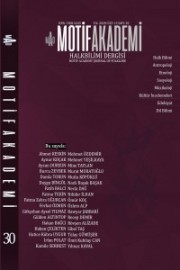ELEKTRONİK KÜLTÜR ORTAMINDA PAYLAŞILAN KORONAVİRÜS (COVID-19) ŞİİRLERİNİN FOLKLORUN VE MİZAHIN PROTESTO İŞLEVİ BAĞLAMINDA KÜLTÜRBİLİMSEL ANALİZİ
CULTURAL ANALYSIS OF CORONAVIRUS (COVID-19) POETRY SHARED IN THE ELECTRONIC CULTURE ENVIRONMENT IN THE CONTEXT OF THE PROTEST FUNCTION OF FOLKLORE AND HUMOUR
Author(s): Ahmet KeskinSubject(s): Customs / Folklore, Media studies, Poetry, Sociology of Culture, Present Times (2010 - today), ICT Information and Communications Technologies
Published by: Motif Halk Oyunları Eğitim ve Öğretim Vakfı
Keywords: Folklore; humour; digital culture environment; protest; coronavirus; poetry; cultural analysis; interdisciplinary studies;
Summary/Abstract: The coronavirus, technically known as SARS-CoV-2 or Covid-19, was first identified in December 2019 in Wuhan, China (Hubei). Before long, it rapidly spread around the globe, leaving behind mass devastation in its wake. The first ever case to appear in Turkey was announced on March 11, 2020. This pandemic has brought the world, our country [Turkey], our daily lives, production, and consumption to a grinding halt. Of course, such out breaks are not new to history. For example, between 1918 and 1920, the Spanish flu, a subtype of the H1N1 virus, wiped out between 50 million and 100 million people. However, as one might assume, a lack of advanced communication tools or solution models meant that the exchange of knowledge back then was nowhere near as fast or accurate as it is today. That said, it is possible to take a closer look the core beliefs and values that underlie the current coronavirus within an digital cultural environment as the virus is identified and spreads this granted our living in an age where communication technology and range are at their peak. Moreover, also can assess how such information is rapidly created and shared within the framework of the same causes. Many a humorous [social media] post related to coronavirus have surfaced online, especially now that the virus has put much of the world is under quarantine (something not yet fully felt in Turkey). Alas, as the situation worsens, it seems that they are losing ground. Intriguingly, many have either a comedic or a protest-like air about them in terms of their type, form, and content. This study has focused several posts that are poetic in nature and analysed them in terms of their folkloric and comedic-protest functions using a culturalist approach and interdisciplinary paradigms
Journal: Motif Akademi Halkbilimi Dergisi
- Issue Year: 13/2020
- Issue No: 30
- Page Range: 502-536
- Page Count: 35
- Language: Turkish

